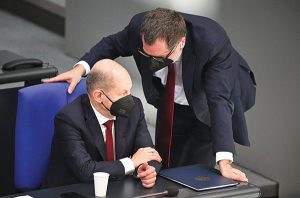Bloomberg
Angela Merkel called Russia’s invasion of Ukraine “a profound turning point in European history.†It’s also been a dramatic wake-up call for her successor as chancellor and prompted a rapid and remarkable shift in German policy on several major fronts.
Olaf Scholz — the Social Democrat who took over from Merkel in December —was widely criticized by opponents and allies alike in recent weeks for what they perceived as dithering and weakness in the face of Russia’s mounting aggression towards Ukraine. Then Vladimir Putin’s recognition of two self-proclaimed separatist republics in eastern Ukraine and the subsequent full-scale attack on the former Soviet republic stung Scholz and his coalition partners in Berlin into action.
Scholz in the last week has halted the certification process for the Nord Stream 2 pipeline built to bring more of the Russian gas his country heavily relies on, abandoned Germany’s long-standing opposition to sending weapons to conflict zones and given way on expelling Russian banks from SWIFT, the system used for trillions of dollars worth of transactions between thousands of banks around the world. The willingness to supply Ukraine with military equipment including surface-to-air missiles and anti-tank weapons is in many ways the most dramatic of the moves.
Such a far-reaching rethink from Scholz and his government came unexpectedly and prompted suggestions that Europe’s biggest economy may finally be ready to punch its weight in the international arena, discarding decades of reluctance linked to its role in the 20th century’s bloodiest conflicts.
“The Russian invasion of Ukraine marks a turning point in history,†Scholz said Saturday. “It threatens our entire postwar order,†he added. “In this situation, it is our duty to do our best to help Ukraine defend itself against Vladimir Putin’s invading army.â€
 The Gulf Time Newspaper One of the finest business newspapers in the UAE brought to you by our professional writers and editors.
The Gulf Time Newspaper One of the finest business newspapers in the UAE brought to you by our professional writers and editors.
